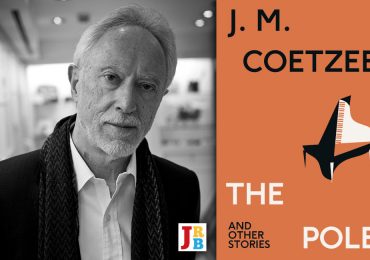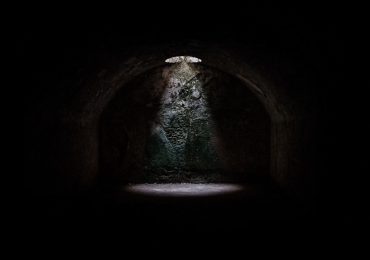Exclusive to The JRB, an excerpt from a work in progress by Perfect Hlongwane.
~~~
Forgiveness
They put me in a wheelchair. A doctor explained to me that I was being booked into the hospital’s psychiatric ward. I smiled, because I knew exactly where I was and where they were taking me. It was, however, unclear to me why they were putting me in a wheelchair. I had walked into the hospital, and my feet had carried me to and fro as I was sent, if only to confirm that this was a government facility, from pillar to post.
But after my admission had, somewhat miraculously I felt, been finalised, the clerk and then the porter merely smiled and ignored me when I asked why I needed the wheelchair. I asked the same question more urgently of the nurses who were busy bustling before and behind me, but I was met only with smiles, frowns, and silence. My questions went unanswered. ‘By the way, I’m mad,’ I quickly reminded myself.
It seemed crazy to me that you would put someone with no injury or infirmity in a wheelchair. Someone who had been walking around in front of you just moments before. At any rate, I was now in the wheelchair and I was being pushed by a porter. He raced us forward when it seemed that a ground floor lift would close us out. ‘Hold it, please!’ he shouted, and we squeezed in at the last moment.
There was silence in the overloaded lift as it creaked upward, until a nurse standing at the back took a break from admiring her reflection in the glassy interior to ask my porter if he was taking me to Ward 724. The porter nodded yes. This nurse smiled kindly at me and whispered, audibly, ‘Shame man.’ This brief exchange didn’t go unnoticed by the other passengers, and they peered down at me with curious, sympathetic expressions.
We got out at the seventh floor. There was an iron gate at the entrance to the ward; open, manned by two stout, scowling guards in tight-fit blue-and-orange uniform. I was beginning to get a clearer picture of how things would stand in my new digs. ‘This is nothing short of a prison,’ I thought, panicking and yet perfectly tranquil. I was still making a mental note of how strong the guards looked when they seized me and, with little effort, lifted me out of the (unnecessary) wheelchair.
The guards began to march me down the passage. I remembered with a jolt that I hadn’t thanked the taciturn porter. I tried to turn around but one of the guards, noting my intention, tightened his grip around my left bicep and reminded me: ‘Siyaphambili.’ Forward I was marched. There was another iron gate, closed but this time unmanned. One of the guards began to strike the metal bars with a bunch of keys. A bunch of keys so huge I grew in the certainty that I was being imprisoned.
A nurse came ambling into view, a formidably-built woman whose girth seemed ready to tear open the seams and rip the buttons off of her tight, white, crisply-starched uniform. She produced an access card, she swiped it, there was a small beep as the gate opened, and the guards delivered me into the hands of this unsmiling caregiver.
The nurse led me into the reception area, which I can only describe as being in great disarray. There was a lot of noise and everyone seemed to be getting in everyone else’s way. My first thought was that the patients had staged a coup.
Confused, I took in the scene. A young male nurse, silent, was writing in a blue notepad. Another nurse, a young woman, was joking around with one of the patients. Yet another was opening a sturdy metal door behind the counter, which led, through a carefully-fortified opening that revealed a burglar-barred security gate, into what looked like a small dispensary. I realised that the nurses and patients were mingling quite freely, even behind the long, clean, stark-white reception counter. There were giggles and guffaws, and loud as well as whispered conversations. A feeling of general camaraderie rather than chaos was the impression that settled on me. My papers were handed over to the nurse with the blue notepad, an athletic young man of medium height, with a wide forehead. He had a striking ebony complexion, his skin seemed to shimmer, and the look in his brown eyes was both patient and stern.
The nurse began to read the contents of my docket, slowly, with a gradually deepening frown, and finally he shook his head. ‘No, chief, killing yourself won’t solve anything,’ he said, measuring me up with an expressionless but all-knowing look. He went back to reading my file. While this was happening, a dishevelled man who looked to be of Ethiopian descent seemed rapidly to be developing an interest in me. This thin, gangly patient was essentially naked, having opted to use his gown as a long scarf twisted around his neck. I could feel and see the undressed man’s eyes fixed on me, a wild glare glowing in them, suggesting both curiosity and contempt.
‘Who are YOU? Who are YOU?’ he asked—it seemed to me that the question was rhetorical. He turned away regally, revealing a small patch of barren scalp between the top and the back of his head, the only blemish on his silky, unkempt crown of dense Ethiopian curls. Then, suddenly, he swivelled round again to glare at me. ‘You are nothing,’ he spat, with palpable disgust. ‘Me, I’m a Mandela!’ He was shouting now, and I heard some of the nurses giggling with good-natured but lazy amusement. The male nurse, who was still going through my file, looked up at the naked Ethiopian for a second and then went back to his reading.
‘Ya, that’s why we always have to see your cock and your balls,’ he said with a soundless sigh, giving him another quick, stern glance. To my surprise, the latter disentangled his gown from where it was draped around his neck, smoothing it down properly over his body. This immediately rendered about him a sane and respectable air.
The Ethiopian man had high cheekbones, an almost beak-shaped nose with just a hint of flaring, long, strikingly twirling eyelashes, and a naturally aloof look in his slightly downward-slanting eyes. Stealing a proper look at him I felt, with a twinge of regret, that such an imperious-looking man ought not to have taken leave of his senses. But, my appreciation notwithstanding, he returned to his hostile glaring at me. Apparently this princely man wanted nothing to distract him from the chilling welcome to which he was subjecting me. Bristling with menace, he started coming towards me, and I was a little taken aback to note that none of the nurses seemed likely to rush to my aid. Two small steps away from me, however, he screeched to a halt and stood to attention, at which the nurse who was reading my file raised his head again, calmly, and looked at him.
‘You think this is Zimbabwe. This is not Zimbabwe, my friend,’ the confrontational Ethiopian hissed at me, clenching his hands into balls of fists. Somehow he had decided that I was Zimbabwean and needed no further confirmation; much the same way that I had decided he was Ethiopian, I suppose. Probably just to be a smart-ass, I decided to correct his error and told him that I was, in point of fact, South African. At this the patient flew into a fit of rage, flailing his arms. A physical attack seemed imminent as he paced from side to side.
‘You are not a South African! You are not a Mandela! ME, I’M a MANDELA!’ He was shouting again, and sweating now, but when he tried to pounce on me, two petite nurses grappled with him and easily led him away. ‘Shame, he is Somalian; losing his shop really affected him badly,’ said one of the nurses, smiling and looking in my direction, so that I understood this to be an explanation.
‘Ya, and they say he lost his younger brother in the violence and looting,’ added another nurse. I cringed with a keen sense of shame remembering the xenophobic attacks that had broken out earlier that year. I could not blot out the thought that this was a stain on the name of my nation that no time would be able to rinse clean. I heard the receding sound of my Somali antagonist’s sobbing down the passage, leading into the interior of the ward, the shoosh-sheesh of his slippers sliding across the tiled floor.
I must have slept on my first night, even though I had feared I wouldn’t, because I remember that in the half or non-light of the silent ward, I had a dream. I dreamed that I was walking with her. I was swimming in a cauldron of conundrums, in the lingering scent of the afterglow of the memory of the moment that she had let me inside her mind. I was tingling and shivering in the hunger and the hangover of the memory of her touch.
In my dream we were kissing. And kissing. In the midst of the wonder of it all, I woke with a start, enervated and invigorated in equal measure. I looked around me. Light from the adjoining passage seemed to reach and yet not quite penetrate the twelve-bed ward. My woken state assumed the uncertain shade of the undeniable but intangible presence of my dream, which it seemed I could not reach out to touch. But she had been here with me. I willed myself back to sleep. Back to my dream. Forced my eyes shut. Perhaps I succeeded. Perhaps not.
In the dead, unmoving silence of the ward, she was there again. Isabel, who slipped through the foolish, fumbling, complacent fingers of my youth. When I awoke again, coming fully out of the dream, or memory, or both, I sat up smiling; remembering her for the first time in a long time entirely without regret.
It seemed like only yesterday that I had held her in my arms. In my arms. Just now, in fact. But also, it seemed like a lifetime ago. Like many lifetimes ago. Like something that had happened in another world. In a different instalment of eternity quite separate from the one I now was in, rueing the ruins of my neglect. It seemed like something that had happened only in a dream. I had her, once. I lost her. For a moment in time, I held the whole world in my hands, and knew it not. But today, only today, only now, I had remembered for the first time without regret. Remembered with something like wonder. Remembered, for the first time ever, with something like thanksgiving.
‘No doubt about it, I have lost my mind as I know it,’ I thought with another smile. I felt a calmness that I could only describe as having the texture of the certainty of what once had been. In the memory of my dream, and in the dream of my memory, it seemed that nothing here, or anywhere, nothing now, and nothing that could come, would ever again disturb my peace. No life, no death, could erase what I had once felt. Had once known. ‘And that, dear heart, is enough,’ I whispered into the morning.
I was sitting up on the bed, my legs dangling freely, my toes curling and dancing in the memory of my rendezvous in the land of slumber, when suddenly I saw the hostile Somali in the wide doorway, darting in from the passage. He was armed with a broken mop handle, its sharp, splintered end zigzagging the air above him. He had a crazed look in his eyes. He was heading straight towards me. I tried to remain calm. His head was cocked sideways, and there was a menacing leer on his sweat-glistened face. If dying was my mission, this man seemed quite anxious to assist me in the task.
‘Stop, in the name of Jesus,’ I heard the patient in the bed next to mine say, just as I was deciding, with no real urgency, whether or not to defend myself. ‘Stop, in the name of Jesus.’ The unexpected sentence was uttered quietly but with great assurance. The broken mop wielder stopped dead in his tracks. The speaker of the magic words sat up slowly on his bed, revealing a chubby little face, with a sparse goat-like beard, atop a set of small, bony shoulders.
His large, round, black-and-white eyes, set deep in his small face, were looking directly into mine, paying no attention whatsoever to my attacker. The Somali, for his part, seemed frozen mid-attack. He was darting glances from me to the peacemaker and back again, looking more confused now than threatening. My neighbour got off his bed. ‘He won’t hurt you,’ he said, landing with catlike agility on the floor. He turned, deliberately, to nod and smile at the Somali and waved him away. ‘You can go now,’ he said. ‘I forgive you.’
I stood, mouth agape, marvelling at the scene. My wild-eyed attacker let the jagged wooden handle slip from his hand, and it fell to the floor without a sound. He seemed to blink with something like surprise before swivelling abruptly and disappearing back into the corridor. I turned around to study the tiny, amiable man who had saved me, and he studied me back. ‘Nobody will get hurt as long as they keep me here,’ he said. ‘That is why God has sent me here, you see. I must stay here. I am a traveller from heaven.’
Amazed, confused, amused, I reminded myself, stamping emphasis on the thought: ‘Remember that everyone in here is mad, including you!’ The small man from heaven stepped forward and held out a disproportionately large, muscular hand. ‘My name is Mthetheleli,’ he said, the smile never leaving his face. We shook hands and I felt something like an electric current run through me at his touch. ‘You are mad, or else you wouldn’t be here, in this place,’ I told myself again, pursing my lips to keep from voicing my thoughts. ‘You are imagining whatever current you think you can feel coursing through your body. You are imagining most of what is happening. Or, at the very least, misapprehending it.’
Mthetheleli let go of my hand, which was throbbing with warmth from the firmness of his grip. For a moment, I breathed in the beauty of the name. Mthetheleli. One who forgives. I wanted to meet the parents who had given their child such a name. But Mthetheleli was speaking again. ‘They are our African brothers,’ he said, gesturing towards the empty doorway. ‘They stood in solidarity with us during a dark time. They never thought that we would turn against them so quickly, drunk on a few sips of freedom. It’s enough to drive anyone mad.’
I took the words in and found that I was having to concentrate to remember that the speaker was also, for all intents and purposes, mad. Hadn’t he just claimed that he was visiting from heaven? Didn’t he seem to be under the impression he had the power to forgive sin? Yes, I mustn’t lose sight of the fact that this kind-looking, soft-spoken man was mad. Just like me. ‘That’s why we are here,’ I thought, attempting to put the matter to rest in my mind.
‘You will be healed,’ Mthetheleli said, smiling, seeming to read my thoughts. ‘Everyone in here will be healed. That is why I have been sent here. Even the doctors and the nurses here will be healed. And when that is done, then, but only then, I will return to where I came from.’ I suddenly wanted to burst out laughing, and I did just that, reassuring myself that I needn’t worry too much about coming across as rude in a place such as this. Mthetheleli seemed unconcerned by my laughter. He just stood there, looking at me, smiling kindly.
Suddenly, a voice barked loudly, interrupting the interminable moment. ‘Bathtime!’ The formidably built nurse who had first received me was standing in the doorway, and every man in the ward, including Mthetheleli, immediately began to stir. She had a commanding air about her.
At breakfast I shared a table with my saviour. By noon, Mthetheleli had told me the whole story behind his admission, in painstaking detail. He had made, he said, the unfortunate mistake of telling his employer exactly where he was from, and what he had been sent down to earth to do. This when his employer had come looking for him at home, after he had missed two weeks of work.
He knew, he mentioned, that his wife had instigated the visit from his boss. But he was not angry with her for having set Mr Van Rooyen on him. He understood that she was worried about him, and about their two children, aged three and six, and for herself. How would they be provided for if he lost his job? ‘She does not understand that manna would fall from heaven before my Father would let my earthly family go hungry,’ Mthetheleli said, smiling.
He had come to the hospital because his wife had said he should, and he wanted to put her mind at ease. He had come because his boss had joined in his wife’s entreaties, and had reassured him that he would not be fired, that his job would be waiting for him when he got better and got out. And he came, Mthetheleli said, because the look in his children’s eyes had made it impossible for him to refuse. I listened to him intently, asking no questions, wondering why I wasn’t getting impatient or bored. Perhaps I was happy to indulge him because his story sounded rock solid mad to me, which made me think that I was perhaps saner than he.
Mthetheleli had a disarmingly earnest look in his big, round, deep-set eyes, and he spoke with a calm deliberation that seemed certain you wanted to hear his story, and that he could take his time. I shared a table with him again when lunchtime came, and I kept noticing that everyone, from the nurses to the doctors to the patients, were visibly happy to see him and to exchange a few words in greeting.
Even my enemy the Somali, who was still glaring at me at every opportunity, seemed to treat him with something like affection. At one stage in the dining hall I thought another confrontation might be in the offing when I saw my antagonist marching towards the table I was sharing with Mthetheleli and a reticent female patient with a world-weary, puffy face. But no, it turned out he was just bringing his cup of soup to Mthetheleli because, ‘I know you like it …’
After lunch, my first full day in the psych ward was occupied by separate meetings with three different doctors. The last of these also had in attendance a group of interns, who drained me with the enthusiasm of their note-taking and questions. I was tired and a little bored when I finally went back to my ward, and I didn’t see Mthetheleli at supper time. Finally, when two young nurses came around to give us our night-time medication, I asked one of them about my newfound friend’s whereabouts. ‘I last saw him at lunch,’ I explained to her.
She looked nervously at the other nurse. ‘He’s gone,’ she said, mumbling. I thought I could see her eyes watering. I couldn’t understand. ‘Home?’ I asked. But she turned away abruptly and walked out of the ward. ‘No,’ the second nurse said. ‘He’s gone for good. We found him hanging in the laundry room.’
- Perfect Hlongwane’s debut novel, Jozi, was published in 2013, and is now available in the Picador Africa Classics series. His second novel, Sanity Please Prevail, is due out in 2018.
© Perfect Hlongwane, 2017





